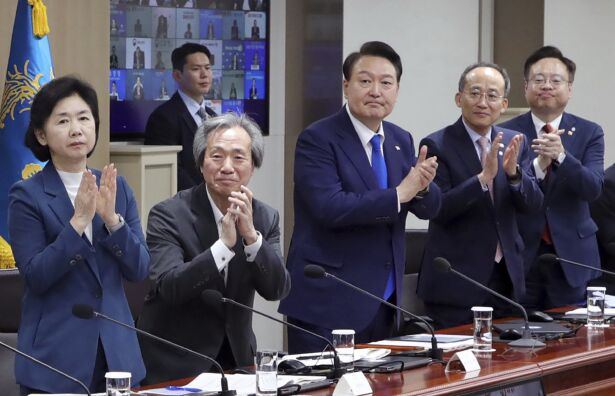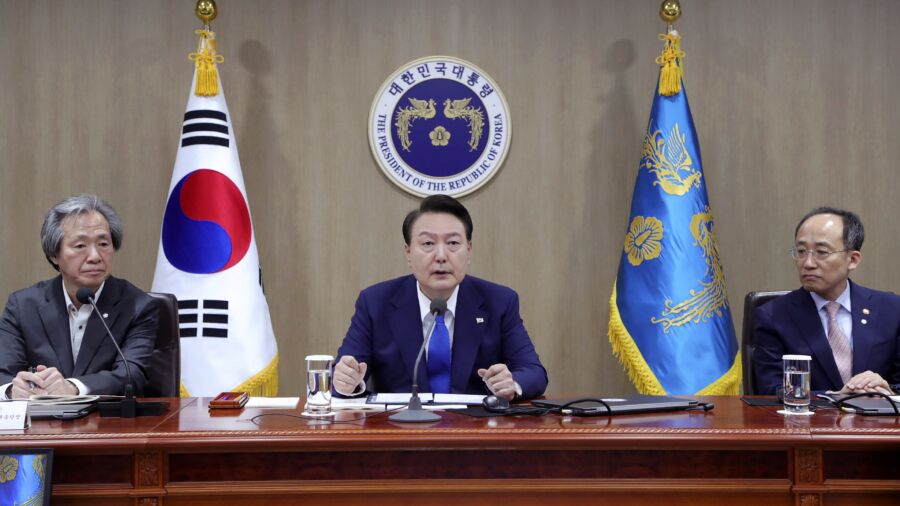SEOUL, South Korea—South Korea will drop its COVID-19 quarantine requirements and end testing recommendations for international arrivals starting next month after the World Health Organization declared the end of the global health emergency.
In lowering the coronavirus alert level from “critical” to plainly “alert” starting June 1, health authorities will also lift mask mandates in pharmacies and small clinics but will continue require mask wearing in large hospitals and long-term care facilities and other medical venues with high infection risks.
The decision was announced during a meeting attended by President Yoon Suk Yeol, where he thanked the country’s medical workers and said it was “delightful that people are getting their normal lives back after three and a half years.”
He said his government will take steps to improve the country’s capacity to deal with future pandemics, including providing stronger support for vaccine developments and expanding international cooperation.

South Korea has been requiring seven-day quarantines for virus carriers. While the mandate will be lifted from June 1, health officials will continue to recommend people to isolate for five days if they test positive for the virus, the Korea Disease Control and Prevention Agency (KDCA) said. Travelers had been advised to take PCR tests within three days after arriving in the country, but that recommendation will also be lifted.
Youngmee Jee, KDCA’s commissioner, downplayed worries that virus measures were being loosened too quickly, saying that the country’s COVID-19 situation was stabilizing, partially because of high vaccination rates and immunity gained through infections during previous waves of the virus.
The fatality rate of COVID-19 after a steady decline is now at a similar level with influenza and there are enough medical resources to deal with a modest rise in infections, with about half of the country’s 700 hospital beds designated to treat serious cases currently vacant, Jee said.
She said officials will maintain preventive measures to protect vulnerable groups, including senior citizens and people with medical conditions, and continue financial support to lower the costs of tests and hospitalizations for virus carriers.
“The risk of COVID-19 is not yet over, but considering the decline in cases, improved medical response capacities and high levels of immunity, we have reached a point where we need to step out of an international emergency state and transition toward a long-term management phase,” Jee said during a briefing.
The announcement came as health workers reported 20,574 new COVID-19 cases on Thursday, which represented a slight increase from last week’s level. Lee Sang-won, KDCA’s chief of epidemiological investigations, said the pace of the country’s COVID-19 infections has moderately increased in recent weeks because of the spread of XBB, a new omicron variant. He said it was unlikely that the spread would develop into another huge wave of the virus.
There are concerns that the lifting of the quarantine mandate will result in people showing up to work when sick, considering the country’s notoriously harsh work culture.
Lim Sook-young, another KDCA official, said the government, for the time being, will continue to provide subsidies to COVID-19 patients in low-income brackets and to small companies when they offer paid leave to sick employees, so that infected people could be encouraged to isolate and recover.
She said government agencies were debating further plans to “institutionalize a culture of resting when sick,” including pushing employers to establish consistent guidelines over paid and sick leave and provide employees expanded options for working at home.
South Korea had maintained a stringent COVID-19 response based on aggressive testing, contact tracing, and quarantines during the earlier part of the pandemic, but has eased most of its virus controls since last year as the omicron variant’s surge rendered those containment strategies irrelevant.
WHO had declared an end to the COVID-19 emergency last week, though Director-General Tedros Adhanom Ghebreyesus noted the viral disease remained a global health threat.
By Kim Tong-Hyung

